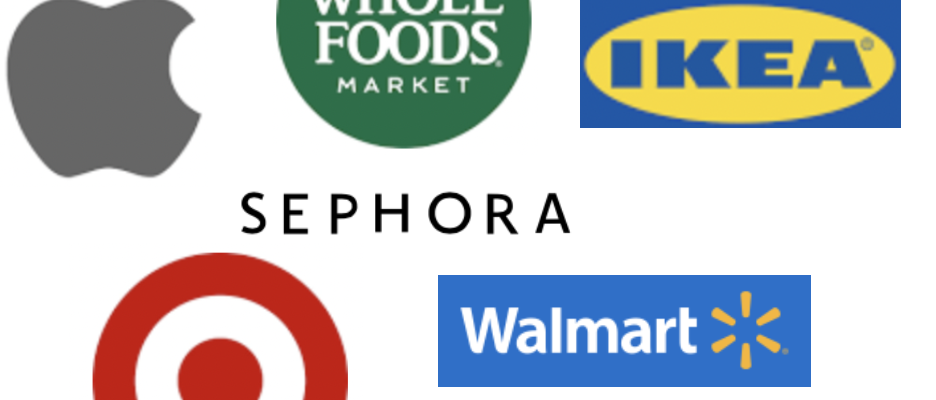Good news!
Several well-known, major retailers are making an effort to reduce harmful chemicals in their products. A report on who is leading the way and who is lagging was published in March 2021 by the Mind the Store campaign, a program of Toxic-Free Future, with the intent of raising consumer awareness of both low and high performers, and, by making statues public, putting pressure on companies to step up their efforts.
I have cut and paste some of the text from a site called “Retailer Report Card”, which ranks companies based on their efforts to reduce toxic chemicals in their products. Here is a summary of their findings in the latest annual report:
- High performers are consistent and more companies are joining their ranks. This year, Sephora and Whole Foods Market were awarded A’s and joined consistent high performers Apple and Target, who each earned an A+, and IKEA and Walmart, both with A- grades. These retailers represent the best in class in their commitment to safer chemicals.
- More retailers are now phasing out dangerous chemicals as a class, making a larger impact on safer products. Retailers are increasingly phasing out entire classes of toxic chemicals such as bisphenols, organohalogen flame retardants, per- and polyfluoroalkyl substances (PFAS), and ortho-phthalates.
- Twelve retailers are targeting PFAS “forever chemicals” for reduction or elimination in food packaging at more than 65,000 store locations globally. 7-Eleven, Ahold Delhaize, Albertsons, Amazon, Chipotle, McDonald’s, Panera Bread, Rite Aid, Taco Bell, TJX, Trader Joe’s, and Whole Foods Market are targeting PFAS for reduction or elimination in food packaging and food service ware.
- Some retailers are taking new action to restrict PFAS in textiles. Lowe’s became the first major retailer to announce it will no longer sell fabric protection sprays containing PFAS. REI announced that it is restricting PFAS in all clothing treatment (and ski wax) products but still allows PFAS in outdoor apparel and other textiles.
- Eight retailers are tackling the most toxic plastics. Polyvinyl chloride (PVC or vinyl) and expanded polystyrene (EPS) foam are among some of the most dangerous plastics due to highly hazardous chemicals used in production or disposal. We evaluated retailers’ actions to phase out these and other toxic plastics for the first time this year. A few noteworthy examples include the pledge by Apple to eliminate all plastics in packaging by 2025, and the phase-out of EPS foam packaging by Yum! Brands (parent of KFC, Pizza Hut, and Taco Bell).
Many Retailers Still Need to Act
While the progress among certain retailers is significant, far too many retailers fail to take even the most basic of actions needed to protect the health of their customers. They have failed to ensure that the products and packaging they sell do not contain harmful chemicals and plastics that can harm consumers, communities, workers, and the environment.
A total of 12 companies earned failing grades this year. Named to the 2021 Retailer Report Card Toxic Hall of Shame are:
- 7-Eleven
- 99 Cents Only Stores
- Ace Hardware
- Alimentation Couche-Tarde (Circle K, Couche-Tard)
- Metro
- Nordstrom
- Publix
- Restaurant Brands International (Burger King, Tim Hortons, Popeyes)
- Sally Beauty
- Sobeys
- Starbucks
- Subway
Why Retailers Must Act Now
- There is growing scientific consensus on the dangers of hazardous chemicals used in everyday products, from cosmetics and cleaning products to plastic packaging and outdoor apparel.
- Customers and investors are demanding safer, more sustainable products that are not causing disproportionate harm to the most vulnerable populations. Retailers that are not managing chemical risks face increasing reputational and financial risks.
- Toxic chemical and cleanup regulations are increasing. States from Washington to Maine are restricting chemicals in products and packaging and the federal government is beginning to act, particularly on PFAS. Retailers can mitigate these risks by getting ahead of the regulatory curve by adopting safer chemicals policies.
- Safer cost-competitive alternatives are available and growing. And emerging tools such as ChemFORWARD, GreenScreen, and Scivera can assist retailers and suppliers in identifying and transitioning to safer alternatives.
- This fifth annual retailer report card continues to show that grading retailers against one another motivates them to improve chemical safety. Retailers should anticipate being evaluated in future reports.
For further detail on this report, please see the Retailer Report Card website. It’s great to see this public airing of company efforts on reducing toxins in their products. I hope more will be included in this report card. If it’s anything like how some healthcare system make performance data of their physicians transparent, thereby increasing competition among the physicians and desire to improve (and they do!), then this could be an effective approach for getting companies to take bigger steps towards cleaning up their production process and products.
